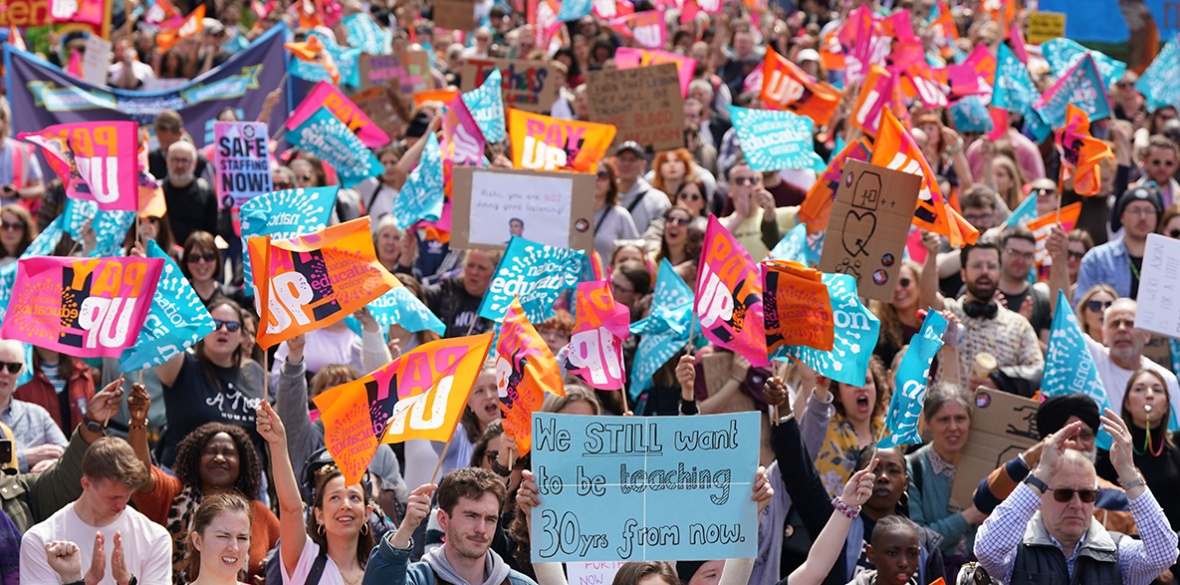This is the last article you can read this month
You can read more article this month
You can read more articles this month
Sorry your limit is up for this month
Reset on:
Please help support the Morning Star by subscribing here
THE British trade union movement is at a crossroads. We face a cost of living crisis that has deep roots in more than 40 years of neoliberal economic reform and the systematic weaknesses in the national economy that have developed as a result.
The decline of Britain’s manufacturing base, the stripping out of skilled, well-paid jobs, and the decimation and privatisation of public services and utilities has left our economy vulnerable to short-term fluctuations, which can have a long-term impact on working people’s incomes.
This has been realised most recently in a crisis which has seen the value of pay plummet. The governor of the Bank of England, earning £575,000 a year, has called on workers to exercise pay restraint as the cost of daily necessities goes up by a staggering amount. Food inflation in the 12 months to March 2023 was running at 19.2 per cent with items like cucumbers up by 52 per cent. In this context, pay restraint is the last thing our economy, or working people, need.
Excess profits and systemic weaknesses in our economy, not wage growth, are the causes of rising inflation.
This is understood by the movement, as the current strike wave shows. Working people are not willing to sit back and watch their share of national income fall, while profits go through the roof.
Teachers, doctors, postal workers, rail workers, civil servants, cleaners, engineers, nurses, university workers, refuse workers, ambulance drivers, porters, bus drivers, telecoms workers and teaching assistants are just some of the groups of workers who have taken strike action recently over pay.
Yet for many of these groups of workers, their motivation goes beyond just the question of pay, even if that is where their legal trade dispute is.
Teachers and support staff who have watched the education system be ground down through systematic underfunding, postal workers who are watching a priceless public service be torn apart by a series of incompetent CEOs, nurses and doctors who work in an NHS stretched to breaking point by mismanagement and part-privatisation, all have legitimate professional concerns about what is happening to the services they love.
In addition, there are those many groups of workers who may not be balloting for or taking action now but are using their collective power to press for an alternative national future.
Artists, pharmacists, social workers, prison officers and probation workers, finance workers, educational psychologists, psychotherapists and steel workers — and of course, those working in food and allied trades, often facing precarious contracts and low pay.
The working class is broad and diverse but, like a slumbering giant that never went away, it has awoken and is beginning to push back against a system in which the odds are stacked against us.
In this context, solidarity and unity must be our watchwords. Our strength derives from the breadth and diversity of the working class and our ability to bring that broad, diverse layer of society together, motivated by a common cause.
However, we also need to learn the lessons of the past, the history of our movement, its successes and failures and the messages it has for how we organise now. We have to understand the economic system we are working within, the impact this has on workers’ daily lives and how it creates phenomena like the cost-of-living crisis.
We have to understand the relationship between the industrial struggles we are engaged in and the political system within which those struggles are played out.
Economics and politics are not two separate closed systems, they are integrally linked and we must be able to operate in both spheres at once, linking industrial campaigns to political power, exercised from the grassroots upwards.
All of these things mean that education, debate and discussion within the movement are crucial.
As we reach the end of our 105th general council meeting, marking 124 years since the General Federation of Trade Unions was founded, that three-part mission — of building unity, solidarity and education — which has characterised the GFTU throughout its history remains as vital and as strong. Now it is our job to deliver it.
Visit www.gftu.org.uk for more information.










